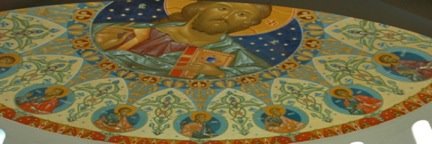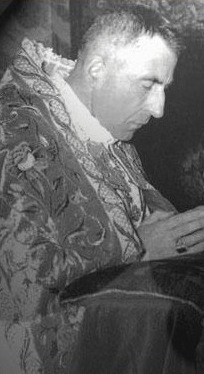
The first three days of Great & Holy Week in the Eastern Catholic tradition
Christ the Bridegroom is the central figure in the parable of the ten Virgins (Matthew 25: 1-13); Christ is the divine Bridegroom of the Church as described in the Book of Isaiah (chapter 54), as well as the primary image of Bridegroom Matins. The title is suggestive of his divine presence and watchfulness ("Behold the Bridegroom comes in the middle of the night...") during Holy Week and his selfless love for his Bride, the Church.
The Bridegroom is also the name given to the central icon used in Bridegroom Matins. The Bridegroom icon and service is also commonly known in the Greek “O Nymphios”.
( let this video play as you read.... )
Bridegroom Matins
Bridegroom Matins is a service specific to the first three evenings (as Matins - a morning service is celebrated “in anticipation” on the eves of feasts and certain other days) of Holy Week and commemorates the last days in the earthly life of the Lord. Incorporated into these services is the theme of the first three days of Holy Week; which is the last teachings of Christ to his disciples. As such, these services incorporate readings and hymns inspiring this theme. The mood of the services is to experience sorrow and to feel Christ's voluntary submission to His passions and highlight the purpose behind the evil that is about to take place against the Lord. The atmosphere is one of mourning (for sins) and is symbolic of the shame the Christian should feel for the Fall of Adam and Eve, the depths of hell, the lost Paradise and the absence of God. The vestments of the Priest and the altar clothes are black or deep purple to symbolise and enhance the atmosphere of mourning and remembrance of sins. The main emphasis of the Bridegroom Service is metanoia and each service has its own particular theme on repentance and watchfulness. One of its primary features is its troparion:
Behold, the Bridegroom comes in the middle of the night, and blessed is the servant He shall find vigilant;
but unworthy is he whom he shall find neglectful.
Beware therefore, O my soul, lest you be weighed down by
 sleep,
sleep,lest you be given over to death and be closed out from the kingdom;
but rise up crying out: "Holy! Holy! Holy are You our God;
through the intercessions of the Theotokos, have mercy on us.
Palm Sunday evening
During the first service on Palm Sunday evening, the priest carries the icon of Christ the Bridegroom into the church. The Bridegroom troparion is sung during this procession, and the icon is brought to the front of the church and remains there until Holy Thursday. The icon depicts Christ as the Bridegroom of the Church, bearing the marks of his suffering, yet preparing the way for a marriage feast in his Kingdom. He is dressed in the icon according to the mockery of the Roman guards just prior to his crucifixion.
* The rope - a symbol of bondage to sin, death and corruption which was loosed with Christ's death on the Cross.
* The reed - a symbol of his humility; God rules his kingdom with humility.
Sunday evening also includes this kontakion:
Jacob lamented the loss of Joseph, but that noble one was seated in a chariot and honored as a king; for by not being enslaved then to the pleasures of the Egyptian woman, he was glorified by Him that beholdeth the hearts of men and bestoweth an incorruptible crown.
Holy Monday evening
On Holy Monday (Tuesday Matins), the Blessed Joseph, the son of Jacob the Patriarch, is commemorated because he is seen as a prototype of Christ.
Joseph was betrayed by his brothers, thrown into a pit and sold into slavery by them. In the same way, the Lord was rejected, betrayed by his own, and sold into the slavery of death and like Joseph forgave and spared his brothers during the famine when they came to him, so too, Jesus Christ offers himself as a sacrifice and forgives all those who come to him in faith.
The Gospel reading for the day is of the Barren Fig Tree, which Christ cursed and withered because it bore no fruit. The fig tree is representative of those who have heard God's word, but who fail to bear the fruits of faith. Originally the withering of the fig tree was a testimony against those Jews who rejected God's word and his Messiah. It is also a warning to all people, in all times, of the importance of not only hearing the God's word, but putting it into action.
Monday evening also includes this kontakion:
Being mindful of the hour of the end, O my soul, and fearing because of the cutting down of the fig tree, labor diligently with the talent that was given thee, O hapless one, and be watchful and cry: Let us not remain outside the bridal chamber of Christ.
Holy Tuesday evening
On Holy Tuesday (Matins for Wednesday), the Parable of the Ten Virgins is read. It tells the story of the five virgins who filled their lamps in preparation for receiving the bridegroom while the other five allowed their lamps to go out and hence were shut out of the marriage feast. This parable is a warning that Christians must always be prepared to receive the Lord when he comes again. The theme of the day is reinforced by the exaposteilarion hymn:
I see Thy Bridal Chamber adorned, O my Savior, but have no wedding garment that I may enter. O Giver of Light, enlighten the vesture of my soul, and save me.
Holy Tuesday's Bridegroom Matins also i
 ncludes commemoration of Kassiani (September 7), also known by the names of Kasia, Kasiani or Ikessia, was a great hymnographer from the 9th century. According to the Synaxaristi not many details of her life have been recorded but she has remained in ecclesiastical history for her great hymns. His Eminence Metropolitan Sophronios Eustratiadis of Leontopoleos [1] writes that Kassiani was "an orphaned girl from the Byzantine era, beautiful and wise, a saintly ascetic and respectful virgin". [2] Kassiani is also linked to the Emperor Theophilos (9th century) and his search for a bride. Theophilos was angered with a reply by Kassiani to a question of his, and he impulsively chose St. Theodora, who was standing next to Kassiani, to be his elected bride. Kassiani also played a great role in the restoration of the Holy Icons.
ncludes commemoration of Kassiani (September 7), also known by the names of Kasia, Kasiani or Ikessia, was a great hymnographer from the 9th century. According to the Synaxaristi not many details of her life have been recorded but she has remained in ecclesiastical history for her great hymns. His Eminence Metropolitan Sophronios Eustratiadis of Leontopoleos [1] writes that Kassiani was "an orphaned girl from the Byzantine era, beautiful and wise, a saintly ascetic and respectful virgin". [2] Kassiani is also linked to the Emperor Theophilos (9th century) and his search for a bride. Theophilos was angered with a reply by Kassiani to a question of his, and he impulsively chose St. Theodora, who was standing next to Kassiani, to be his elected bride. Kassiani also played a great role in the restoration of the Holy Icons.Heartbroken by Theophilos, one of those poems was the beautiful hymn of Kassiani, which in the Byzantine tradition is such a major feature that the service held on Holy Tuesday evening is often referred to simply as the Hymn of Kassiani. Theophilos searched for Kassiani and found her at a convent and the two never saw each other again. Her repentance and love for Christ is the theme of the wonderful Hymn of Kassiani which is chanted on this night, reminding all that they may be forgiven if they repent.
The text of the hymn, based on the account of the sinful woman who is introduced by the Evangelist St Luke in his Gospel (7:36-50). Kassiani contrasts the repentance of the sinful woman with Eve's fall (Gen. 3:8-11):
The woman who had fallen into many sins, perceiving Your divinity, O Lord, received the dignity of a myrrh-bearer, for with lamentation she brought fragrant myrrh to You before Your burial. And she cried: Woe is me, for love of sin and stings of lustful passion envelop me as the night, dark and moonless. As You cause the clouds to drop down the waters of the sea, accept the fountain of my tears. As by Your indescribable condescension You bowed down the heavens, so incline to the groaning of my heart. I shall kiss Your most pure feet and wipe them with the hair of my head, those same feet whose sound Eve heard at dusk in Paradise when she hid herself in fear. Who can count the multitude of my sins? Who can measure the depths of Your judgments, O Saviour of my soul? Do not turn away from me, Your servant, for You have immeasurable mercy.
Tuesday evening also includes this kontakion:
I have transgressed far more than the harlot, O Good One, yet have never brought you showers of tears; but entreating in silence, I fall before you, as I kiss your immaculate feet with love, that as Master you may grant me forgiveness of offences, as I cry out, O Saviour: deliver me from the filth of my works.
( here is some chanting in English...)
( here are the words... )
AS THE LORD WAS GOING TO HIS VOLUNTARY PASSION,
HE SAID TO THE APOSTLES ON THE WAY,
BEHOLD, WE GO UP TO JERUSALEM,
AND THE SON OF MAN SHALL BE DELIVERED UP, AS IT IS WRITTEN OF HIM.
COME, THEREFORE, LET US ALSO GO WITH HIM,
PURIFIED IN MIND.
LET US BE CRUCIFIED WITH HIM AND DIE THROUGH HIM
TO THE PLEASURES OF THIS LIFE.
THEN WE SHALL LIVE WITH HIM AND HEAR HIM SAY:
I GO NO MORE TO THE EARTHLY JERUSALEM TO SUFFER,
BUT TO MY FATHER AND YOUR FATHER,
TO MY GOD AND YOUR GOD.
I SHALL RAISE YOU UP TO THE JERUSALEM ON HIGH
IN THE KINGDOM OF HEAVEN.
HERE ARE SOME OF THE OTHER AWESOME LITURGICAL
TEXTS OF THE BRIDEGROOM MATINS SERVICES:
TODAY CHRIST'S HOLY PASSION DAWNS UPON THE WORLD AS A SAVING LIGHT,
FOR HE COMES OF HIS GOODNESS TO SUFFER:
HE WHO HOLDS ALL THINGS IN HIS HAND
CONSENTS TO BE HUNG UPON THE WOOD
IN ORDER TO SAVE MANKIND.
TODAY SHINES AS THE FIRST-FRUITS OF THE PASSION OF THE LORD!
COME, THEN, ALL WHO LOVE THE FEAST AND JOIN TOGETHER IN HYMNS,
FOR THE CREATOR COMES TO ACCEPT THE CROSS,
THE AFFLICTIONS, THE BEATINGS AND THE JUDGMENT BY PILATE.
A SERVANT STRIKES HIM ON THE HEAD,
BUT HE ENDURES ALL THINGS THAT HE MAY SAVE MANKIND.
THEREFORE, LET US CRY OUT TO HIM:
GRANT REMISSION OF SINS TO THOSE WHO VENERATE YOUR HOLY PASSION IN FAITH,
CHRIST OUR GOD, THE LOVER OF MANKIND!

WE HAVE REACHED THE SAVING PASSION OF CHRIST OUR GOD.
LET US, THE FAITHFUL, GLORIFY HIS INEFFABLE FORBEARANCE,
THAT IN HIS COMPASSION HE MAY RAISE US UP WHO WERE DEAD IN SIN,
FOR HE IS GOOD AND LOVES MANKIND.
YOU TAUGHT YOUR DISCIPLES, LORD, TO DESIRE WHAT IS PERFECT,
SAYING: BE NOT LIKE THE GENTILES, WHO OPPRESS THE WEAK.
IT SHALL NOT BE SO WITH YOU, MY DISCIPLES.
FOR OF MY OWN WILL I AM POOR.
LET THE FIRST AMONG YOU, THEREFORE, BE THE SERVANT OF ALL.

LET THE RULER BE LIKE THOSE WHO ARE RULED.
LET HIM WHO IS FIRST BE LIKE THE LAST.
FOR I HAVE COME TO SERVE ADAM IN HIS POVERTY,
AND TO GIVE MY LIFE AS A RANSOM FOR THE MANY WHO CRY TO ME:
O LORD, GLORY TO YOU!
THE FIG TREE WAS WITHERED UP BECAUSE IT WAS UNFRUITFUL.
WE SHOULD FEAR THE SAME PUNISHMENT, O BRETHREN,
AND BRING WORTHY FRUITS OF REPENTANCE TO CHRIST,
WHO BRINGS TO US GREAT MERCY.
LET US LOVE THE BRIDEGROOM, BRETHREN.
LET US KEEP OUR LAMPS AFLAME WITH VIRTUES AND TRUE FAITH,
SO THAT WE, LIKE THE WISE VIRGINS OF THE LORD,
MAY BE READY TO ENTER WITH HIM INTO THE MARRIAGE FEAST.
FOR THE BRIDEGROOM, AS GOD, GRANTS UNTO ALL AN INCORRUPTIBLE CROWN.
JUDAS LOVES MONEY WITH HIS MIND.
THE IMPIOUS ONE MOVES AGAINST THE MASTER.
HE WILLS AND PLANS THE BETRAYAL.
RECEIVING DARKNESS, HE FALLS FROM THE LIGHT.
HE AGREES TO THE PRICE AND SELLS THE PRICELESS ONE.
AS PAYMENT FOR HIS DEEDS THE WRETCH GAINS HANGING AND A TERRIBLE DEATH.
FROM HIS LOT DELIVER US, CHRIST GOD,
GRANTING REMISSION OF SINS TO THOSE WHO CELEBRATE YOUR IMMACULATE PASSION WITH LOVE.
Why are you idle, my wretched soul? What useless cares cause you to
be lost in dreams? Why busy yourself with things that pass away? The
last hour is at hand, and w
 e shall be parted from all earthly things.
e shall be parted from all earthly things.Therefore, while there is yet time, rouse yourself and cry: I have
sinned before You, my Savior. Do not cut me off like the barren fig
tree. In Your compassion, O Christ, take pity on me who call out with
fear:
HOW SHALL I, THE UNWORTHY ONE,
APPEAR IN THE SPLENDOR OF YOUR SAINTS?
FOR IF I DARE ENTER YOUR BRIDAL CHAMBER WITH THEM,
MY GARMENTS WILL BETRAY ME;
THEY ARE UNFIT FOR A WEDDING.
THE ANGELS WILL CAST ME OUT IN CHAINS.
CLEANSE THE FILTH OF MY SOUL, O LORD,
AND SAVE ME IN YOUR LOVE FOR MANKIND.
MY SOUL HAS SLUMBERED IN LAZINESS.
I HAVE NO LAMP AFLAME WITH VIRTUES.
LIKE THE FOOLISH VIRGINS I WANDER AIMLESSLY WHEN IT IS TIME FOR WORK.
BUT DO NOT CLOSE YOUR COMPASSIONATE HEART TO ME, O MASTER.
ROUSE ME, SHAKE OFF MY HEAVY SLEEP.
LEAD ME WITH THE WISE VIRGINS INTO THE BRIDAL CHAMBER,
THAT I MAY HEAR THE PURE VOICE OF THOSE THAT FEAST AND CRY UNCEASINGLY:
O LORD, GLORY TO YOU!
(!!! ONE OF MY FAVORITES!!!)
COME, FAITHFUL,
LET US WORK ZEALOUSLY FOR THE MASTER,
FOR HE DISTRIBUTES WEALTH TO HIS SERVANTS.
LET EACH OF US ACCORDING TO HIS ABILITY
INCREASE HIS TALENT OF GRACE:
LET ONE BE ADORNED IN WISDOM THROUGH GOOD WORKS;
LET ANOTHER CELEBRATE A SERVICE IN SPLENDOR.
THE ONE DISTRIBUTES HIS WEALTH TO THE POOR;
THE OTHER COMMUNICATES THE WORD TO THOSE UNTAUGHT.
THUS WE SHALL INCREASE WHAT HAS BEEN ENTRUSTED TO US,
AND, AS FAITHFUL STEWARDS OF GRACE,
WE SHALL BE ACCOUNTED WORTHY OF THE MASTER'S JOY.
MAKE US WORTHY OF THIS, CHRIST OUR GOD,
IN YOUR LOVE FOR MANKIND.
AS THE SINFUL WOMAN WAS BRINGING HER OFFERING OF MYRRH,
THE DISCIPLE WAS SCHEMING WITH LAWLESS MEN.
SHE REJOICED IN POURING OUT HER PRECIOUS GIFT.
HE HASTENED TO SELL THE PRECIOUS ONE.
SHE RECOGNIZED THE MASTER, BUT JUDAS PARTED FROM HIM.
SHE WAS SET FREE, BUT JUDAS WAS ENSLAVED TO THE ENEMY.
HOW TERRIBLE IS SLOTHFULNESS!
HOW GREAT HER REPENTANCE!
SAVIOR, YOU SUFFERED FOR OUR SAKES:
GRANT US ALSO REPENTANCE, AND SAVE US.

O, THE WRETCHEDNESS OF JUDAS!
HE SAW THE HARLOT KISS THE FOOTSTEPS OF CHRIST,
BUT DECEITFULLY HE CONTEMPLATED THE KISS OF BETRAYAL.
SHE LOOSED HER HAIR WHILE HE BOUND HIMSELF WITH WRATH.
HE OFFERED THE STENCH OF WICKEDNESS INSTEAD OF MYRRH,
FOR ENVY CANNOT DISTINGUISH VALUE.
O, THE WRETCHEDNESS OF JUDAS!
DELIVER OUR SOULS FROM THIS, O GOD.
TODAY, THE EVIL ASSEMBLY HAS GATHERED AND PLOTS AGAINST YOU.
TODAY JUDAS RECEIVED CONDEMNATION FROM THE AGREEMENT:
CAIAPHAS CONFESSES UNKNOWINGLY.
FOR THE SAKE OF ALL YOU WILL ACCEPT DEATH FREELY;
CHRIST GOD, OUR REDEEMER: GLORY TO YOU!







































No comments:
Post a Comment